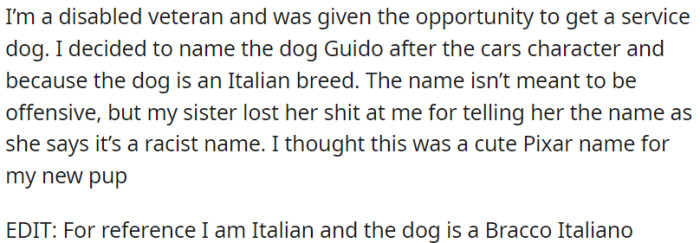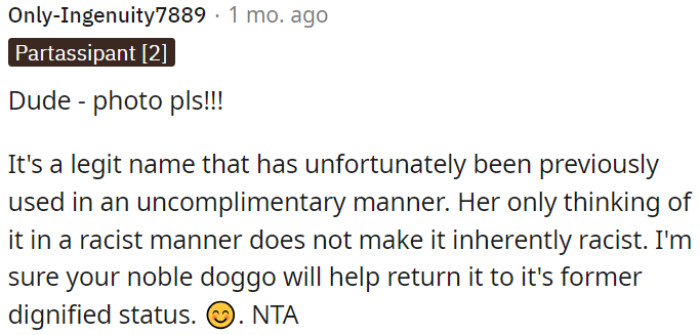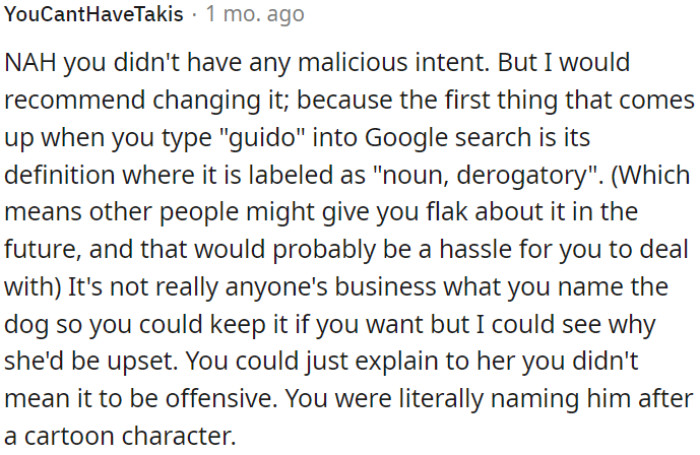Disabled Man Names His Service Dog Guido, Sister Tells Him It Is Racist Thing To Do
In a touching story that took a surprising twist, we meet an OP, a strong disabled veteran who faced a new and unexpected problem after his time in the military. Despite the challenges he had gone through, he maintained a positive attitude and decided to welcome a special helper into his life – a Bracco Italiano service dog.
To show his love for his family background and the things he enjoys today, he named his furry friend "Guido," after a friendly character from a famous movie called Cars. OP, who values his Italian roots, thought the name was a nice way to remember where he comes from and to honor the kind of dog his new friend is.
He saw the name "Guido" as a way to showcase the dog's good qualities, not as anything mean or hurtful. However, when he told his sister the name he chose, he received a surprising reaction.
His sister was upset about the name "Guido." She believed it had negative connotations and reminded her of unfair stereotypes about certain groups of people.
She worried that using that name might inadvertently support hurtful ideas. OP was confused by his sister's strong feelings.
He explained that he only thought of the friendly character from the movie and his family background when he picked the name – he didn't mean to upset anyone.
Guido is a real name

Service dogs are specially trained animals that assist individuals with disabilities. They can help people who have visual impairments, hearing loss, mobility challenges, mental health issues, and other disabilities.
These intelligent and loyal animals are trained to perform tasks such as guiding their handlers around obstacles, retrieving objects, alerting them to sounds, or providing emotional support. The bond between a service dog and its handler is often strong and built on trust, with the dog becoming an essential part of the person's daily life.
Regulations and guidelines help ensure that service dogs are given the access they need to accompany their handlers in public spaces, making it easier for those with disabilities to lead more independent lives.
The name is quite common

It seems OP's sister is acting like the type of person who constantly seeks reasons to be offended

Cultural Sensitivity and Naming Conventions
Choosing a name for a service dog can reflect deeper cultural values and personal identity. In this case, the name 'Guido' may be perceived as a light-hearted homage to Italian heritage. However, the potential for misunderstanding or offense highlights the importance of considering how names can carry cultural weight.
Experts in social psychology emphasize that names can hold significant power in shaping perceptions and interactions. Dr. Jonathan Haidt, a social psychologist, notes, "Names can evoke stereotypes that influence how we perceive individuals," which underscores the need for careful consideration in naming. For further insights, visit his professional website at JonathanHaidt.com.
The name is legitimate but has had negative associations

OP's dog's name isn't her concern

"Sister should mind her own business."

It's essential to recognize that cultural appropriation concerns are valid and can evoke strong emotional responses. The backlash against the name 'Guido' may stem from a broader societal context where marginalized cultures often face misrepresentation or trivialization. Understanding this can help individuals navigate naming conventions with greater awareness and sensitivity.
Moreover, discussions around name choice can serve as a platform for educating others about cultural respect and the implications of our choices, encouraging a more thoughtful dialogue.
OP's story shows that even small decisions can have big consequences. The veteran wanted to honor his background and a character from a movie by naming his dog "Guido." However, it turned into a problem because the name had some negative meanings for other people.
This teaches us that we need to be careful about our choices, even if we don't mean any harm. In today's world, where we discuss how different cultures are represented, we should think more about how our actions can affect others. OP didn't mean anything bad, but his choice sparked conversations about important topics like how different groups of people are perceived.
The Role of Humor in Naming
Humor often plays a significant role in how we perceive and engage with the world. Naming a service dog 'Guido' might be intended as a playful nod to cultural stereotypes, but it can risk reinforcing negative connotations associated with those stereotypes. Research in humor psychology suggests that humor can be a double-edged sword; while it can foster connection, it can also alienate or offend.
Understanding the broader implications of humor in naming is crucial. Inappropriate humor often stems from a lack of awareness, and this situation serves as a reminder that what seems funny to one person may be hurtful to another.
Psychological Analysis
This naming situation reflects a common challenge in balancing personal expression with cultural sensitivity. It's crucial to consider how our choices may impact others, especially in a diverse society. Engaging in open dialogues about cultural significance can foster understanding and prevent misunderstandings.
Analysis generated by AI
Analysis & Alternative Approaches
Overall, this incident underscores the complex interplay between cultural identity, humor, and sensitivity. As individuals navigate personal and social interactions, recognizing the diverse perspectives that influence our choices can lead to more respectful and inclusive environments.



